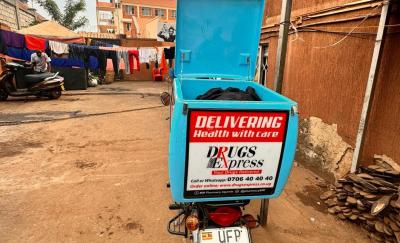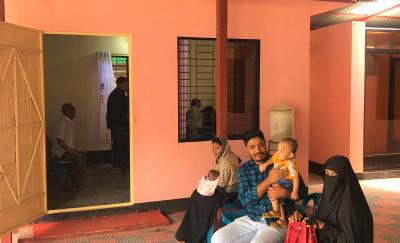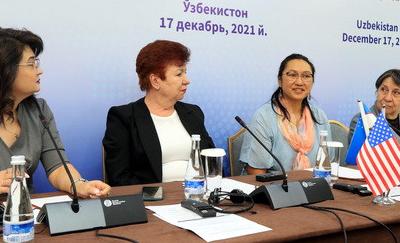Abt Gives Kyrgyz Health Workers Tools to Fight Vaccine Misinformation


COVID-19 has impacted the lives of millions of people in Kyrgyz Republic, none more than health workers. They have worked tirelessly since the beginning of the pandemic to care for COVID-19 patients, sometimes at great risk to their own lives. So far Kyrgyz Republic has recorded more than 200,000 COVID-19 cases, among them nearly 8,000 healthcare workers.
Today, COVID-19 vaccines are the most effective protection against hospitalization and death and are widely available across the country. But because of misinformation promoting fear and hesitation, only 28 percent of the population has received at least one dose.
Health workers play a central role not only in providing continued care, but also in promoting vaccination and combatting misinformation with evidence-based health education for their patients. The Kyrgyz Republic Ministry of Health (MOH) has set a target to vaccinate 3.4 million people, or 70 percent of the eligible population in 2022. The U.S. Agency for International Development (USAID)-funded, Abt-led Local Health System Sustainability Project (LHSS) is working to support the MOH in reaching this goal. We are partnering with the Republican Center for Health Promotion and Mass Communication to design activities that would provide information and communication tools to the country’s most important resource, its health workers.
Interpersonal communications skills to understand patient concerns
Interpersonal communication in healthcare is often defined as the ability of medical staff to elicit and understand patient concerns, to explain current issues, and to engage in shared decision-making if desired. In this pursuit, Abt has developed the first of its kind methodology on interpersonal communication for medical staff to address public concerns about COVID-19 vaccinations.
Working with the Republican Center for Health Promotion and Mass Communication, Abt has conducted a series of training courses on interpersonal communication. Three hundred fifty healthcare workers throughout Kyrgyzstan have participated and will go on to share their knowledge with their staff and co-workers.
As part of this training, participants learned about the concept of herd immunity, the effects of the COVID-19 vaccine on the body, vaccine safety and efficacy, and potential side effects after vaccination. They also received tools that will improve their interactions with patients and make it easier to address their concerns.


Getting consistent, reliable sources of information
As soon as COVID-19 vaccines were available, the government of Kyrgyz Republic required all medical workers to get vaccinated. At least 73 percent of medical workers are vaccinated today, the highest rate of any group in the country. But this vaccination campaign was not accompanied by information about the important safety and efficacy data that made the vaccines’ global production and distribution possible. As a result, many health workers still have concerns about vaccines despite their vaccination status.
Nasiba Abizova is an immunization nurse in the family medicine center of Kant, a small town located in the Chüy Valley of northern Kyrgyz Republic. She recalls that when the government issued its vaccination mandate for health workers, she knew that vaccines were safe and effective in preventing disease. But she acknowledges that others had concerns about vaccine safety. “At that moment, there was no reliable information about vaccines against COVID-19 per se. It felt as if we were "guinea pigs" and many people were afraid,” Ms. Abizova said.
An avid internet consumer, she came across stories and social media that warned of possible side effects from COVID-19 vaccines. “There were all sorts of explanations as to why governments might be using vaccines to reduce certain populations worldwide – for political and other reasons,” she said. “Now that the effectiveness of vaccines against COVID-19 is undoubtable, we should make sure that our population trusts them. This is how we should get back to our normal lives.”
During the training, the instructor answers immediate questions and concerns while providing validated sources for continued reference.


Counseling patients when there is conflicting guidance
One of the biggest challenges for health workers has been deciphering differing guidance from health authorities and providing recommendations to their patients. “At one point, the government interim recommendations were that pregnant women should not receive vaccination,” recalls Aizharkyn Egembergieva, a specialist at the Republican Center for Health Promotion and facilitator for the Interpersonal Communications training. “However, at that time, the World Health Organization (WHO) was strongly advising that pregnant women indeed be prioritized for vaccination. This caused confusion among health workers as they did not know how to advise their patients.” “Today,” she adds, “our protocols for pregnant patients are aligned with those of WHO.”
Going forward, to ensure that training materials for health care workers reflect the most up-to-date clinical guidance, LHSS will collaborate with the MOH and strengthen its capacity to produce and broaden public access to trusted information about the pandemic.
To date, participants have found the training exceptionally valuable. “The training was really eye-opening for me, because I did not know the differences between the kinds of vaccines, and, more importantly, I did not know how to properly convey all this information to the public,” explains Ms. Abizova. “Not only did we gain technical knowledge on vaccines, but we also learned how to communicate with our patients to effectively address their concerns.”
Interpersonal communication in healthcare is critical in fighting COVID-19 and can lead to higher patient satisfaction and improved outcomes. Through this training, Abt expects to reach at least 2,000 healthcare providers, who in turn will provide guidance to thousands of people across the country.
Read More About the LHSS Project

Local Digital Innovation Improves Family Planning in Uganda
An LHSS grant helped a Ugandan pharmacy expand an e-Pharmacy platform to include more family planning (FP) products and train staff to provide FP counseling.

Funding Model Helps Bangladesh Expand Primary Health Care
Some municipalities fund primary health care services in urban areas of Bangladesh.

Collaboration Improves Health Insurance Coverage in Nigeria
Abt helped two Nigerian agencies collaborate to increase access to health insurance.

USAID Completes Uzbekistan COVID-19 Emergency Response Activity
The Abt-led Local Health System Sustainability COVID-19 Response Activity played a key role in helping Uzbekistan combat COVID-19.